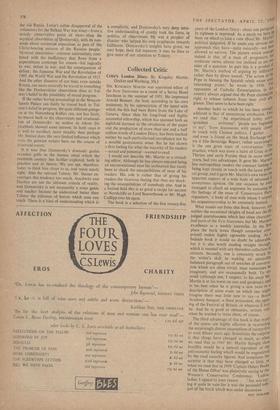Collected Critic
Critic's London Diary. By Kingsley Martin. (Seeker and Warburg, 30s.) Critic's London Diary. By Kingsley Martin. (Seeker and Warburg, 30s.)
MR. KINGSLEY MARTIN was appointed editor of the New Statesman as a result of a Savoy Hotel luncheon in the summer of 1931. He impressed Arnold Bennett, the host, according to his own testimony, by his appreciation of the speed with which the fish had been flown from the Lake of Geneva. Since then his long-lived and highly successful editorship, which has spanned both an eightfold increase in the circulation of the paper and the production of more than one and a half million words of London Diary, has been marked neither by such particularised sycophancy nor by a notable gastronomic sense. But he has shown a firm feeling for what the majority of his readers —actual and potential—wanted to read.
1 would not describe Mr. Martin as a crusad- ing editor. Although he has always enjoyed being an unconventional man his inclination has rarely been to shock the susceptibilities of most of his readers. His role is rather that of giving his readers the vicarious feeling that they are shock- ing the susceptibilities of somebody else. And in a limited field this is as good a recipe for success as Northcliffe or Lord Beaverbrook or Mr. Hugh Cudlipp ever hit upon.
The book is a selection of the first twenty-five
years of the London Diary : about one paragraPho in eighteen is reprinted. As a result we havens basis on which to take a view about Mr. Martins political judgment. If he made any obvious MITI appraisals they have—quite naturally—not bee, allowed to survive. The picture which ernerr, indeed is that of a man of progressive but moderate views, almost too inclined to see t‘sc sides of a question. In part this is a product .°t; Mr. Martin's method of arguing by infiltration rather than by direct assault. 'The action of the Pope in blessing the Spanish rebels raises some interesting points.' he wrote in 1936. opponents of Catholic Emancipation in It country always argued that the Pope claimed the right to release subjects from their civil alle glance. They seem to have been right.' Another habit to which he has been strongly addicted is that of anonymous attribution. Thus we read that : 'An experienced lobby Orre, spondent . . . estimates'; 'people are beginina, ,' to say'; 'from discussions with people closely in touch with Chinese politics, I gather and even 'a friend on the Stock Exchange tell me it [the Beveridge Report, rather surprisinglY.! is the one great topic of conversation.' 111,.1' practice, which was more a habit of Critic in tile, Thirties and early Forties than in more recent had two advantages. It gave Mr. Marlins less metropolitan readers the constant feeling being kept closely in touch with the latest pol° cal gossip;and it gave Mr. Martin's own views the, apparent support of a wide bOdy of informed anonymous opinion. On one occasion he even managed to clinch an argument by summing up the feelings of the mass of 'Conservative Party organisers,' a body of men with whom 1 suspect his acquaintanceship to be extremely limited. What stands out from this book, however, 81,e neither the occasional sleights of hand nor thetir judged querulousness which has often character- ised parts of the New Statesman, but Mr. Martin's excellence as a weekly journalist. In the firs' place the book (even though somewhat over' priced) makes highly agreeable reading. As a bedside book it would no doubt be admirable' but it is also worth reading straight through; which is unusual with any themeless collection of extracts. Secondly, one is constantly struck by the writer's skill in making an admirably balanced paragraph out of snatches of conversa- tion which are often trivial, must sometimes be imaginary, and are occasionally both. To MY mind (although not, I suspect, to his own) Mr' Martin is at his worst on cats and gardeners. and at his best when he is giving a new twist to 3 description of some event on which one might imagine there was little new to say—a Royal Academy banquet, a State procession, the open- ing of the Festival of Britain, or whatever it MaY be. And he is good at obituaries, written onlY when he wanted to write them, of course.
The third advantage of this book is that manY of the pieces are highly effective in re-creating the surprisingly distant assumptions of twenty-five or even fifteen years ago. Sometimes the surpsse is that things have changed so much, as when we read that in 1947 Mr. Martin thought class hostility would be a natural ingredient of the, anti-motorist feeling which would be engendered by the road casualty figures. And sometimes the surprise is that they have changed so little. as when we read that in 1939 'Captain Osbert Peake of the Home Office' was plaintively saying to the Women's Conservative Conference, 'Ladies, ladies. I appeal to your reason . . .' but was saY" mg it quite in vain for it was the perennial sub- ject of the birch which was under discussion.
ROY WOO°










































 Previous page
Previous page